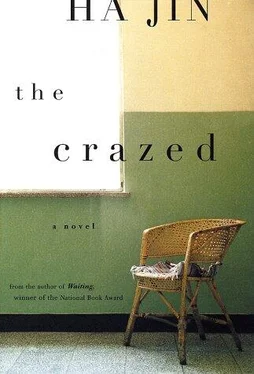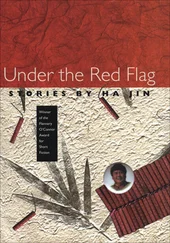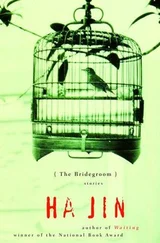I dropped the newspaper on the red floor and thought about Mr. Yang’s speech. Not until just now had it ever entered my mind that he might desire to become an official. He had often told me that he hated bureaucrats. If he really meant what he said, why did he yearn to be one of them? Probably he used to be able to quench this hankering, but now he was too ill to suppress it anymore. Or maybe this longing had been dormant in him all the time and even he himself wasn’t aware of it; now when he lost his mind, it manifested itself.
On the other hand, I shouldn’t be too hard on Mr. Yang. Empleomania was commonplace among the intellectuals I knew. A case in point was the provost of our university, Shengtan Bai, a renowned mathematician, who was now dying of cancer. Four months ago when he heard that he was being considered for the provostship, without delay he began to bike through the campus once every other day to demonstrate that he was in adequate health, though in reality he was suffering from rectal cancer. He was a stalwart man, weighing at least two hundred pounds. It was said that after every bicycle ride he’d lie in bed at home groaning in pain for hours on end. Eventually he did get the promotion and stopped teaching and doing research. Unfortunately, he couldn’t enjoy the high post for long because his cancer had spread. He sat on the leather swivel chair in his new office only a few times, having to stay home two weeks after his appointment. Now he couldn’t even attend official banquets, unable to sit anymore.
To be fair, when Mr. Yang was in his right mind, he had never appeared keen about any official position. Many times he told me to be detached and disinterested, which he believed was the only proper way of pursuing scholarship. He would say, “I’d talk of poetics only with those who have an unpolluted mind.” How often he expressed to me his contempt for some pseudo-intellectuals, whose sole ambition was to enter officialdom and whose main function was to write editorials for the Party’s publications, to prepare speeches for their superiors, and to attack the people the authorities disliked. In Mr. Yang’s own words, “A scholar must not be a clerk or a mouthpiece of others.”
The previous winter when he returned from Canada, he had told me excitedly that scholars in the West lived more like intellectuals. He and I were sitting in his living room, which also served as a dining room. He explained to me over Dragon Well tea, “My friend at UC-Berkeley said that in his department nobody coveted the chair, because they all wanted more time for research. Contrary to this darned place”—he knocked the dining table with his knuckles as if it were the desk in his office. “Here to become a departmental chair is the pinnacle of a professor’s career. But scholars abroad are more detached and don’t have to be involved in politics directly, so they can take up long-term research projects, which are much more valuable and more significant. Oh, you should have seen the libraries at Berkeley, absolutely magnificent. You can go to the stacks directly, see what’s on them, and can even check out some rare books. Frankly, I would die happy if I could work as a librarian in a place like that all my life.”
True, he might have romanticized the academia in the West, but he was genuinely moved. Later he advised me to consider attending graduate school in the United States, saying, “You can live a real intellectual’s life there after you earn a Ph.D. from an American college.”
His advice surprised me, because I had never imagined living in a foreign country. Although it was fashionable among graduate students to study abroad, I hadn’t thought about this matter for myself. How could Mr. Yang talk of emigrating from our homeland like moving to another province? Did he make this suggestion also for the sake of his daughter? In other words, he might have figured that it was impossible for Meimei to go abroad on a scholarship in medicine, whereas I might receive some financial aid in the humanities, so only through me could she get to America. But I soon dismissed my misgivings and was convinced that he mainly had my interest in mind. Despite lacking confidence in my English, I decided to contact some schools in the United States. I applied to Yale, Columbia, the University of Wisconsin at Madison, and UC-Berkeley. Mr. Yang wrote a stunning recommendation for me, saying I was a rising scholar in poetic studies in mainland China. I was somewhat embarrassed by his excessive praise, though he meant what he said. He even offered to pay the twenty-nine-dollar TOEFL fee for me, since I couldn’t come by any foreign currency myself.
A month later I sat for the test, in which I didn’t do well. The written part went all right now that I had a solid grasp of English vocabulary, idioms, collocations, and syntax, but the part on listening comprehension dragged my scores down. I left many questions unanswered, not able to follow a meteorologist’s forecast and the conversation between a postman and a woman customer. So my total score was merely 570, below the 600 standard most Ph.D. programs in the humanities required. To my amazement, the University of Wisconsin accepted me, though it wouldn’t offer me any financial aid. Without a penny I couldn’t possibly go to the United States. To be honest, I wasn’t disappointed at all, because I still could not see the point of studying Chinese poetry in a foreign country. What’s more, I was unsure if I could survive in America. A former graduate student of our department, an excellent calligrapher, had gone to New York to study toward a master’s degree in journalism, and ever since he arrived there he had slaved as a busboy in a Cantonese restaurant in Manhattan. His parents were terribly worried that he might lose his mind, as he often complained in his letters that he had become an educated coolie, working more than fifty hours a week to earn his tuition, and might never graduate — he was too exhausted to study.
Last winter I began to prepare for the Ph.D. exams seriously. Mr. Yang once said that after I entered Beijing University, it would be easier for me to get a scholarship from an American college. He explained, “You’ll hold a vintage position.” His words implied that Beijing University was a prestigious school, internationally known, so foreign colleges would be more willing to accept its students. He was still bent on sending me abroad. I was not enthusiastic about the idea, still daunted by English, which I could read but couldn’t write or speak. How could I accomplish any significant work in poetic studies in America without the ability to write well in English? Besides, I was not fully convinced that a foreign country could be a better place than China for studying Chinese poetry. Mr. Yang’s eagerness suggested that he might indeed have his daughter’s interest in mind. My doubts revived.
Now as I was sitting in this sickroom and thinking whether I should apply for a graduate program in America again, Mr. Yang yawned and said, “I must save my soul.” He smacked his lips as if chewing something tasty.
I was puzzled, but tried to imagine where he was now and to whom he was speaking. Then he declared, “I’m only afraid I’m not worthy of my suffering.”
I listened hard, but his voice trailed off.
The next evening all the graduate students in the Literature Department were gathered for a meeting, at which Secretary Peng presided. She was a macho woman with a Mongolian face, which would remain stern on such an occasion. Although she was not old, just in her mid-forties, she looked down on women who wore skirts. Even on broiling summer days she would dress in baggy pants and a long-sleeved shirt. Sometimes she put on an army uniform that had lost its green. Despite having only six years’ schooling, she was well versed in officialese and tended to digress in front of an audience. Without the help of a text, she’d talk on and on, “rambling like a tumbling river,” as people say about such a speaker. So at most meetings she would read from a speech or a report ghostwritten for her. Several faculty members in the department served as her “pens”; among them Yuman Tan, a man of thirty-nine and a lecturer in philology, was the glibbest one.
Читать дальше

![Lao Zi - Dao De Jing [Tao Te Ching] (english)](/books/3890/lao-zi-dao-de-jing-tao-te-ching-english-thumb.webp)
![Lao Zi - Dao De Jing [Tao Te Ching] (chinese)](/books/3891/lao-zi-dao-de-jing-tao-te-ching-chinese-thumb.webp)
![Lao Zi - Dao De Jing [Tao Te Ching] (espanol)](/books/3892/lao-zi-dao-de-jing-tao-te-ching-espanol-thumb.webp)







